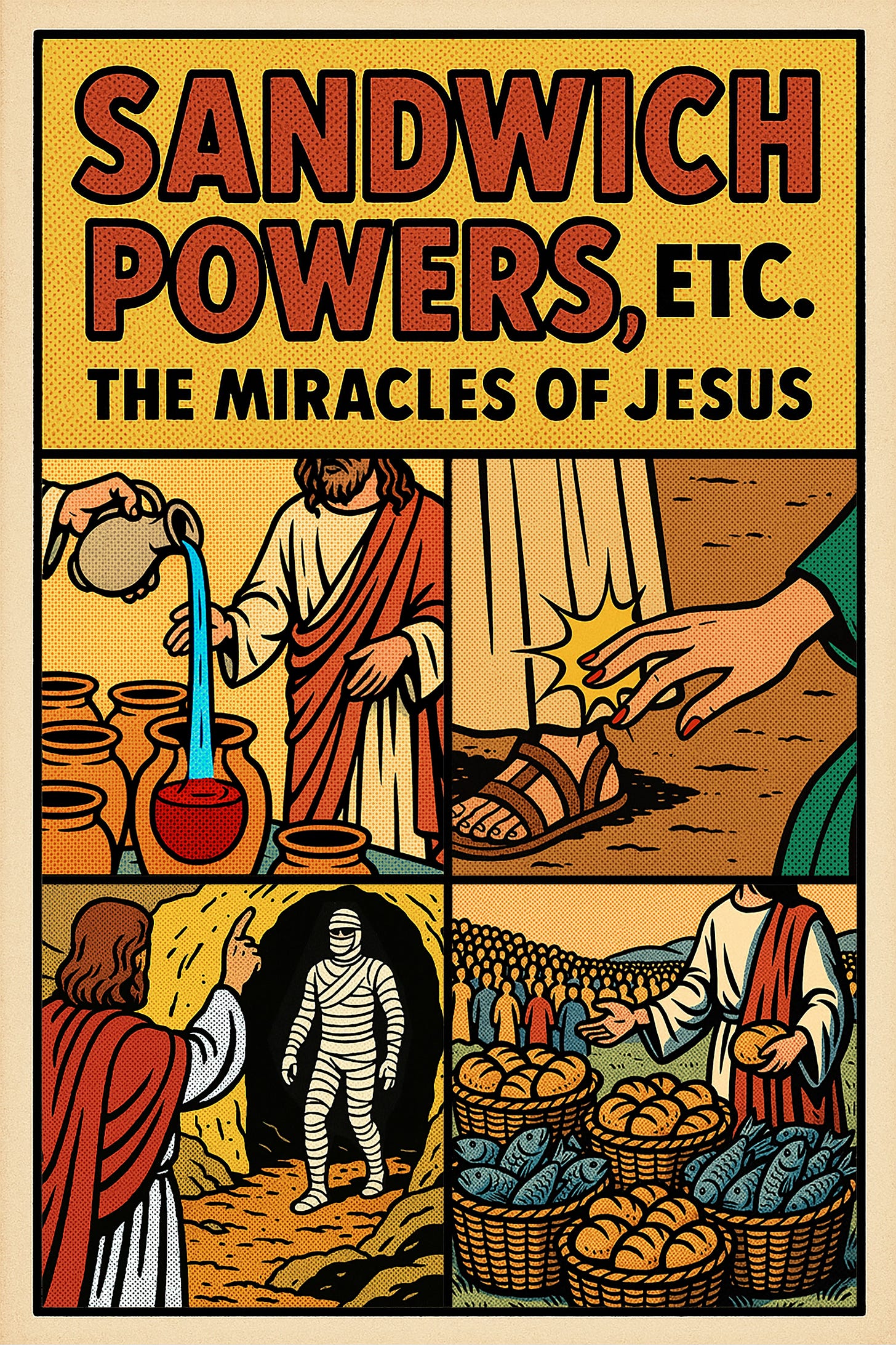Mark 9.14-28
It is absolutely a true story.
Just before Halloween in 2016, the church receptionist buzzed my office phone one morning. I said, “Hello?”
And Stefanie cleared her throat and coughed. A nervous laugh followed. She said, “Um, Jason.”
“Yes.”
“Yeah, um, there’s a guy on line one… he says he needs an exorcist.”
“Come again?”
It is an absolutely true story.
“On line one,” Stefanie said, “he says he needs an exorcist; like, you know— the movie.”
“Put him through,” I sighed, knowing the LORD had just taken an eraser to my day’s To Do List.
I pressed line one and introduced myself.
In a brusque Rhode Island accent, he said his name was Eric.
He sounded like the kind of guy who sports an ironic mustache and who purchases all his food from the farmers market.
“Have we met?” I asked.
“No, sir.” he replied, “We’re new to the area and— my wife and I— we’re not really religious people. That’s sort of the problem, I guess.”
“Problem?” I asked.
“Look,” he said and then fell silent, like he had spilled all his words onto the kitchen floor. I pictured him closing his eyes and forcing himself to speak through his mortification. “Look, this is the last call I ever thought I’d make— and otherwise, honestly, I’ve got no use for someone like you— but…” More stuck silence ensued. “But have you ever done a…” And again he fell mute, as though a power greater than embarrassment compelled him not to bear witness to his reality. “Do you have any experience with exorcisms?” he finally managed to say. Only he pronounced it like he was inquiring about a personal trainer, “Exercism.”
“I think we need an exercist.”
“If you’re about to ask me to send you gift cards or wire you money in Nigeria,” I replied, “then I’m hanging up.”
“No, wait. I’m not cranking you, I swear. Believe me. I swear.” He uttered the last word as an oath, “I swear.” Then he asked me again, “Do you have any experience with exercisms?”
“Yes,” I lied.
He gasped like he had been underwater too long, the relief filling his lungs like oxygen. “Could you come by the house?” he asked, “Like, today? Does right now work?”
I agreed.
I wrote down his address.
I hung up the phone.
And knowing my assistant would see it, I turned to my computer and I blocked out the afternoon on my Outlook Calendar.
“Exercism,” I typed.
Like Eric, I swear— it is an absolutely true story.
They lived on the street that was ground zero every year for my boys’ trick-or-treating operation. I parked on the street. A sign stood at attention in their front yard pitted against their neighbor’s rival Make America Great Again signs. Ironically, the sign said, “Hate Has No Home Here.” From the driveway, I could hear their dog inside, whimpering and barking. They opened the door before I could ring the bell. They invited me inside but did not motion for me to sit. He and his wife stood next to each other in the family room like dismayed parents who have been summoned in the middle of the night to the emergency room.
A broom was propped against the wall. A dust pan filled with broken glass lay on the floor. A busted picture frame lay amidst the debris— a beach scene.
As it turned out, he did have a mustache and the body of a linebacker. His wife was tall and thin. They were just a bit older than me; they both looked bleary. The dog, a cream-colored labradoodle, had not relented its tantrum, pacing in a circle as it alternated between crying to itself and barking at invisibly occupied air.
I was about to introduce myself to his wife, but she interrupted me.
“We moved here a month ago,” she said.
“We had to get a hotel earlier this week just to get some sleep,” Eric muttered, “It’s been that long.”
“I know it sounds crazy,” she said, “But— there’s no other explanation— we’re convinced the house is…”
Now she fell mute as quickly as if someone had ripped her power cord from the socket.
“You think the house has a demon,” I said.
They both nodded. They looked relieved I didn’t immediately conclude that they were crazy. “You still believe in that sort of stuff?” Eric asked, “I’m actually sort of surprised. Most of the Christians I know seem pretty secular.”
“You must know a lot of preachers,” I muttered.
He laughed and looked at me to see if I was serious.
“I think the challenge of being a Christian today,” I said, “is to appear as strange to our world as the first Christians appeared to their world.”
“But you really believe in evil spirits?” his wife asked.
“Karl Barth called demons “Exponents of Falsehood.”” I said.
“Karl who?”
“It doesn’t matter.”
“But you really do believe in demons?”
I nodded.
“Why would I not? According to Christianity, the logic is elegantly simple. There is Evil. And Jesus is not only risen he is indeed God. The reality of the former is an assertion imposed by the fact of the latter.”
“Do you always talk like this?” Eric asked.
“No,” I lied.
I looked around the house.
“Do you have children?”
“He’s our baby,” Eric said, pointing at the dog, “He’s been like this, non-stop, since we moved here, crying and barking. We’re afraid it’s killing him. At night, we hear groanings in between the walls. There’s no sense in hanging any more pictures on the wall because they keep falling down. The same goes for the dishes, even though the cupboards are closed.”
Then they walked me to the guest bedroom to show me— again, this is an absolutely true story— what looked like claw marks scratched against the wall in a diagonal from the ceiling to the floor.
The two of them looked far too tired to be conning me.
“What do you think?” Eric asked me with an almost reverent whisper.
“I think I’d like to go back downstairs.”
When we returned to the family room, Libby— I learned her name was Libby— collapsed onto the sofa. “We’ve tried everything,” she said, exhausted tears leaking from the corners of her eyes.
“What all have you tried,” I asked, genuinely curious.
“We took down all the curtains,” he said, “We read more light could introduce positive energy into the space.”
“And then we tried one of those Tibetan singing bowls, the metal ones that make a sound when you strike it,” she recalled.
“We sprinkled salt in all the rooms,” he added, “I read that it helped but it didn’t. I even snuck into the Catholic Church near my office and stole a sandwich baggie of holy water from the whatever you call it. Then we tried crystals from that new age shop in Old Town.”
“Two days ago we burnt sage and smudged the whole house with it. But all it accomplished was setting off the fire alarm.”
Her tears became weeping, “We can’t afford to move.”
“Nothing has worked,” he said to me with soft urgency.
“Have you tried praying?” I asked.
They both blushed.
“Praying? To who? To what? Like to God?”
I nodded.
They shook their heads.
“No.”
Suddenly Eric looked at me like I was the Shaman on Planet of the Apes, a relic from a conjured world.
“We’re not believers. We’re not religious. We’re atheists, in fact. Christianity always struck me as superstitious. We both have graduate degrees. The idea of asking deity to intervene for you— it seems silly, doesn’t it (no offense)?”
Bless your heart, I thought.
“Let me get this straight,” I said, “You’ve been banging away on a metal bowl like a hippie yoga instructor who lives in a souped-up van on the beach, and you’ve been burning sage brush like a bona fide Babylonian pagan? But prayer strikes you as a bridge too far?”
Eric reluctantly nodded.
“Your problem isn’t that you’re atheists,” I said, “Your problem is that you’re too religious.”
“Help us,” Eric’s wife pleaded, wiping her wet eyes and then drying her hands on her jeans.
Just then, Eric made sure I caught his worried gaze. He smoothed his mustache and said, “We’ve never fought with each other like we have these last few weeks. It’s done something to us.”
I nodded.
“Okay,” I said, “I can try to help.”
“What are you going to do?” Eric asked, looking down at my empty hands as though he was wondering where was my doctor’s bag of spiritual implements.
“I’m going to pray,” I said.
“That’s it?!” Eric asked, panicked— like I didn’t understand the severity of their desperation.
“Would you feel better if I’d shown up wearing a Proton Pack?” I asked.
“But you’re just going to pray?! You’re not going to do anything else?!”
“Jesus promises I don’t need to do anything else,” I said, “And if Jesus is a liar then we all have a much bigger problem than whatever ill spirit haunts this house.”
I’d worn my collar to look the part.
I reached into the breast pocket of my blazer and pulled out my iPhone. Sitting in my car outside their house, I had pulled up the exorcism prayer from John Wesley’s Book of Common Prayer.
“Should we hold hands or something?” Eric asked.
He looked as frightened of prayer as he was of the alien and mysterious Dominion in their home.
“Or maybe we should close our eyes?” Libby added.
“Do whatever you want. Nothing you do is going to make this work.”
They nodded and I suddenly I realized that I was every bit as odd and eerie to them as the spirit for which they had summoned me.
“Let’s start upstairs,” I suggested, “And work our way back down.”
They followed me in a single file line to the master bedroom of the modest bungalow. I woke my screen. With my right hand, I made the sign of the cross in every direction. And I cribbed from the old prayer aloud:
“I COMMAND thee, unclean spirit, in the Name of the Father, of the Son, and of the Holy Ghost: that thou come out and depart from this home whom our Lord Jesus Christ hath vouchsafed through the holy Baptism of his suffering, death, and resurrection. Therefore thou cursed spirit, remember thy sentence, remember thy judgement, remember the day to be at hand wherein thou shalt burn in fire everlasting, prepared for thee and thy angels. And presume not hereafter to exercise any tyranny towards these persons, whom Christ hath bought with his Precious Blood. Amen.”
“Amen,” Libby mumbled awkwardly.
“That’s a little more direct than burning sage,” Eric said, “What next?”
“We go to the next room,” I said and gestured to the door.
When we got to the guest room, the room with the marks on the wall, they stayed in the hallway and shut their eyes, nervous my sixteenth century prayer would provoke a frontal assault. But again, I simply made the sign of the cross and I prayed in the Triune Name.
When I said “Amen,” Eric looked around at the apparently unchanged room.
“I guess I was hoping for some kind of sign it worked,” he whispered.
In the kitchen, as I made the sign of the cross, I noticed three brown paper grocery sacks on the floor. Each of them was filled halfway with broken glass and pieces of shattered ceramic. Unopened moving boxes labeled “Pots and Pans” and “Spices” and “Pantry” rested on the kitchen island. In their distress, they hadn’t yet unpacked them.
I prayed yet again:
“I COMMAND thee, unclean spirit, in the Name of the Father,
of the Son, and of the Holy Ghost: that thou come out and
depart from this home whom our Lord Jesus Christ hath
vouchsafed…”
I said “Amen.”
“Still nothing,” Eric replied.
“What— you expected the wall to writhe in pain or the oven to explode or your wife’s head to spin around?”
He shrugged, as if to say, “Yeah, pretty much that’s what I expected.”
“This isn’t Beetlejuice,” I replied, “This is the real world.”
Eric smiled at what he took to be sarcasm; he seemed not to have noticed that their dog had stopped his whimpering and barking at the empty air.
When we finally wound our way back to the family room and foyer, I invited them to stand in the threshold of the front door.
I closed the window on my phone.
“I think you ought to pray now,” I said.
Eric all but convulsed at the notion and threw his hands behind his back.
“Why me?” he snarled.
And Libby shot me a look of anger, like I was suddenly trying to recruit them rather than help them.
“We asked for an exercist not an evangelist,” Eric reminded me in a customer service tone of voice.
“I know,” I said. “It’s just that Jesus says some demons can only be driven out through prayer.”
“Okay, but why does it have to be us doing the praying?” he pushed back.
I gestured with my hands for him to calm down.
“Well,” I said, “Jesus’ point is not that prayer is the biggest weapon in the spiritual warfare arsenal. Christ’s point is that the posture of humility necessary for prayer is how the demonic is driven away. We resist the Devil by yielding to God.”
They both nodded like they at least understood me.
“Look, I can keep praying if that’s what really want,” I said, “But the surest way for you to be set free is to say to God, “Help me!” You’ve tried everything else— why don’t you try taking Jesus at his word.”
“But I don’t even believe in Jesus,” Eric said softly.
“So what,” I said, “I didn’t say try believing in Jesus. I said try believing Jesus— believe what he said that there are some Exponents of Falsehood in this world that can only be exorcized by the humility prayer requires.”
“But I don’t— we don’t— believe in God,” Eric insisted.
“Fine, start there,” I said, “Say to Jesus: help my unbelief.”
“Okay,” and he pointed at my phone, “And then I should read that prayer.”
“This prayer?” I put my phone back in my pocket, “This prayer isn’t even in the prayerbook anymore. The prayer is not magic. Just extemporize. Say to Jesus: help my unbelief. And then ask him to handle this demon— one little word from him can fell him.”
He turned to Libby whose cheeks flushed crimson.
“This is so embarrassing,” his voice shook.
“That’s exactly why its guaranteed to work,” I said.
His words came out halting and gun-shy, like he was boy asking a girl on a date for the first time. By the end he even tried to mimic me making the sign of the cross.
Afterwards, Eric leaned on the frame of his front door for a long, quiet moment. Libby stood next to him and rested her head against shoulder. The dog lay at their feet in the foyer.
Finally, Eric turned and said to me, “I don’t know if it worked, but I feel like an incredible burden has been lifted from me.”
I nodded.
“Demons possess,” I said, “Jesus frees.”
It is an absolutely true story.
And it is only one of three times I have been called to such an endeavor.
But you are forgiven if such a story strikes you as incredible. After all, your unbelief is not your fault; it’s taken hold of you. It has possessed you. That is, you have been socialized to believe that stories of evil spirits belong not to the “real world” but to the world of the scriptures. You did not come to that conviction on your own; you have been conditioned to believe those two worlds are not, in fact, the same world. The question is what— or Who— so indoctrinated you.
Karl Barth says:
“The Devil rejoices when he notices that he is not noticed; the Devil rejoices when he notices that he is boldly demythologized, that humanity thinks it can tackle its lesser and greater problems with a little morality and medicine and psychology and aesthetics, with progressive or conservative politics— the Devil rejoices when he notices that he is not noticed and his own reality as evil remains beautifully undisclosed.”
For example—
Readers rush to zero in on the demon-possessed boy in this passage, even dismissing the possession as what we know to call epilepsy. And epilepsy may be how the demonic has a hold of this boy; nevertheless, the specifics of his affliction are irrelevant because this boy is not the only person in the passage in the grip of the demonic.
We fail to notice.
And the Devil rejoices.
In his second letter to the Corinthians, the Apostle Paul says that Satan works primarily by twisting (political) disputes into estrangement and disunity, and then Satan uses that estrangement and disunity to tempt each side of the fracture into believing that the separation between them is a sign of their fidelity and righteousness. Satan’s cleverest device, Paul says, is to make self-righteous division feel like faithfulness. Because Satan is a self with no substance, evil requires our cooperation. And the Devil, scripture attests, enlists our collaboration through our assertions of our rightness.
Look again at the text.
When Jesus returns from the Mount of Transfiguration with Peter, James, and John, he finds the other nine disciples embroiled in antagonism with the scribes— the stewards of the Torah. The disciples’ failure to exorcize the demon from the boy has called Christ’s authority into question. The resulting dispute between the community of Jesus and the community of scribes has ensnared an entire crowd and lured them to choose sides. In the passage, the demonic possesses the father’s boy through his epilepsy. But the demonic has beguiled everyone else in the passage through the controversy instigated by this boy’s possession. In the words of St. Paul, they have all been “outwitted by Satan and ignorant of his devices.” This is why Jesus laments, “O faithless generation, how long am I to be with you? How long am I to bear with you?”
In other words, the Devil finds easy work in our eagerness to argue.
There is more going on in this text than we notice.
And because we fail to notice it, we make the grievous mistake of thinking that the world of the Bible is somehow different from our so-called real world. Just so, we fail to notice his devices all around us.
And Satan rejoices.
He tried to tip me before I left.
I waved him off.
“It’s like Rick Moranis’ line in My Blue Heaven,” I said to him, “You don’t tip FBI men.”
“Haven’t seen it,” he said.
I’d stepped off his stoop when he asked me, “So, preacher man— I can call you if, you know, it comes back?”
I thought about it for a moment. And then I shook my head, “No. If there’s a next time, you don’t need me. You’ve got the words now.”
His face grew anxious.
“Well, is there anything I can do to make sure it doesn’t come back?”
I considered his question.
And I jutted my chin towards the “Hate Has No Home Here” sign that stood arrayed against the signs in the adjoining yard.
“You could befriend your neighbors,” I said, “Instead of announcing to the world your antagonism with them.”
He looked at me like it was a non sequitur.
He didn’t notice the connection.
And the Devil rejoiced.
“I’m being serious,” he said.
“So am I,” I said, “Probably more serious than you. Everyone complains about the state of things, but the whole world would be better off if more of us were ready to believe the incredible and simply pray, “Help my unbelief.”
Though Eric and Libby lived less than half a mile from me, I did not see them again until Christmas when I placed the body of Christ in Eric’s hands, held forth like a humble beggar.













